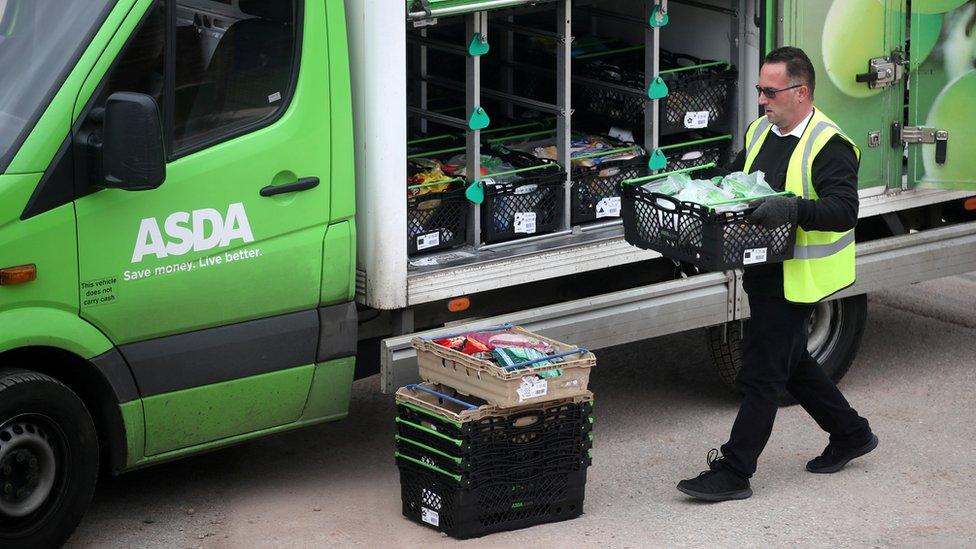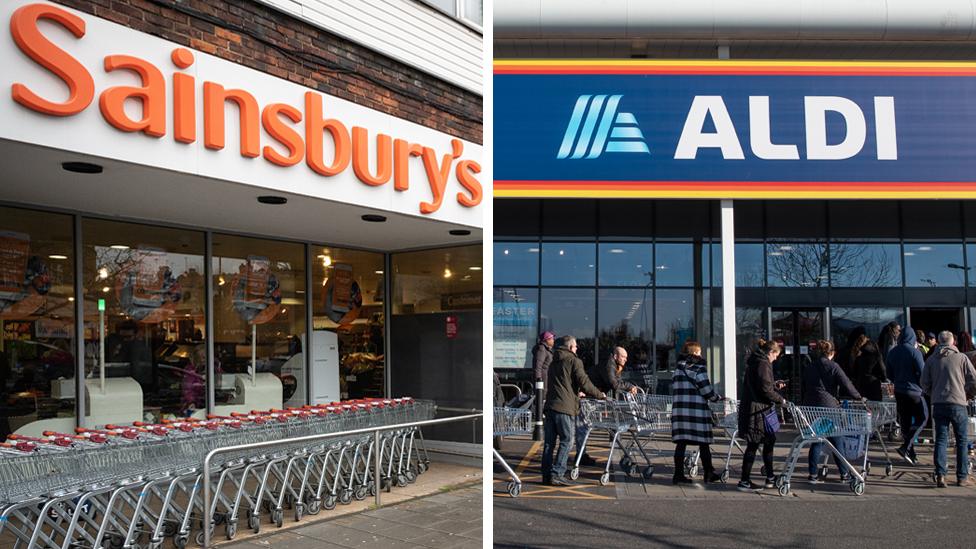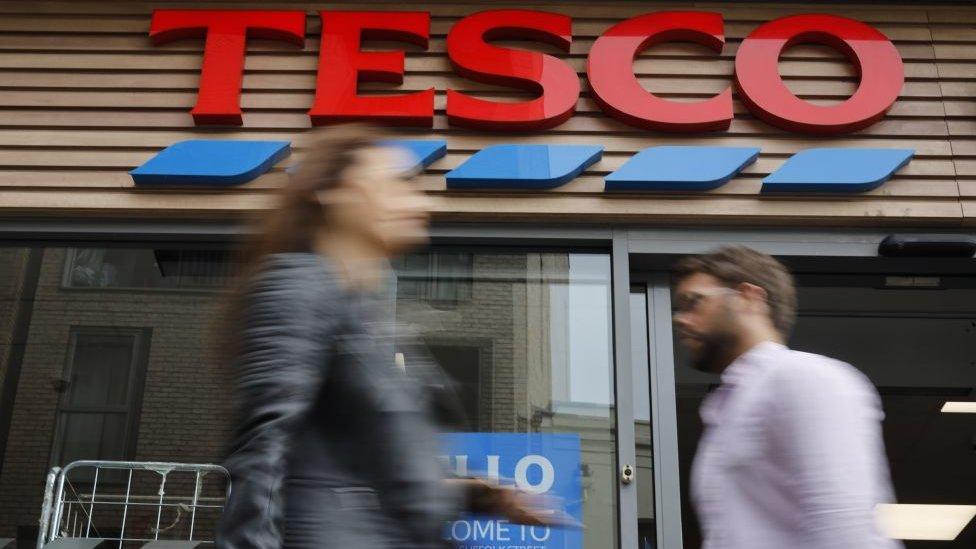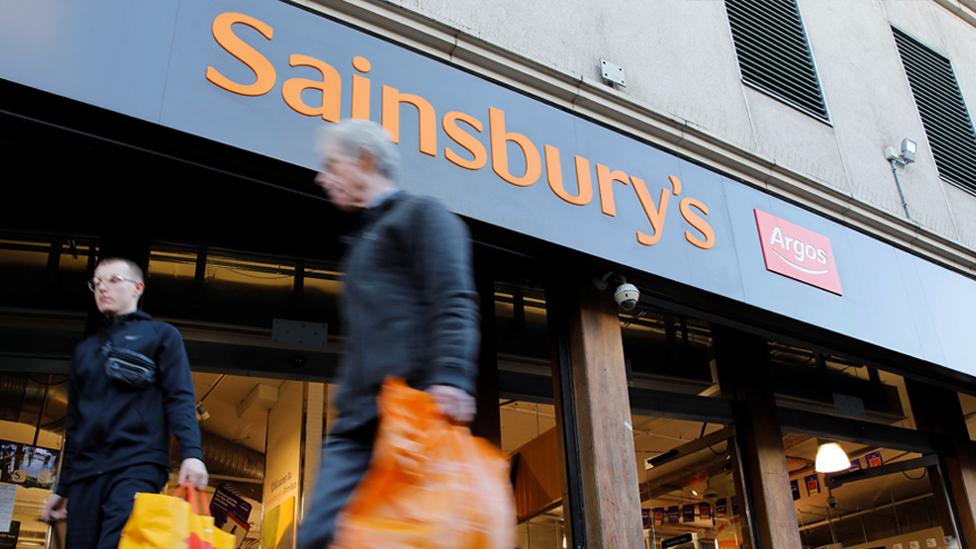Asda joins rivals to pay back Covid rates relief
- Published
- comments

Asda has announced it will repay £340m of business rates relief it has received during the pandemic.
It follows similar moves by Tesco, Sainsbury's, Morrisons and Aldi and means the grocers will collectively return more than £1.7bn.
Supermarkets, whose sales have boomed in the crisis, have been criticised for taking government help while paying dividends to shareholders.
Asda said its costs of dealing with Covid had outweighed any state support.
But its president and chief executive, Roger Burnley, said: "As the hope of a vaccine and a more 'normal' life returning in 2021 grows, we have confidence that we are in a strong position to again do the right thing for the communities we serve."
Earlier on Thursday, Sainsbury's said it would hand back £440m of rates relief it had received, followed by Aldi which pledged to repay £100m.
It was followed by discount retailer B&M, which said it would forgo £80m of rates relief.
B&M stores sell some food, alongside homewares, toys and electrical goods.
On Wednesday, Tesco and Morrisons promised to repay £850m between them.
Both Sainsbury's and Aldi said the decision reflected the fact they had been allowed to stay open in lockdown while non-essential shops had to close.

Labour said big supermarkets had "done the decent thing" but urged the government to pass on the £1.7bn handed back already to hard-hit businesses such as pubs and restaurants operating under the new tier system.
The Treasury said any funds returned would "support the ongoing efforts to protect people's jobs and incomes".
'Fair and right'
Asda has recently been bought by the UK-based billionaire Issa brothers and private equity firm TDR Capital from Walmart of the US in a deal valuing the supermarket chain at £6.8bn.
Mr Burnley said: "Almost half our customers are telling us they expect their financial position to worsen in the next 12 months and we recognise that there are other industries and businesses for whom the effects of Covid-19 will be much more long lasting and whose survival is essential to thousands of jobs."
He said Asda would discuss with the government and devolved authorities the best way to return the money "to ensure the relief we have received can go towards helping those that need it most".
Sainsbury's said that its sales had been "stronger than originally expected", despite it facing "significant costs" in the crisis.
"With regional restrictions likely to remain in place for some time, we believe it is now fair and right to forgo the business rates relief that we have been given on all Sainsbury's stores," boss Simon Roberts said.
"We are very mindful that non-essential retailers and many other businesses have been forced to close again in the second lockdown and we hope that this goes some way towards helping them."
Giles Hurley, boss of Aldi UK, said returning the full value of its business rates was "the right decision to help support the nation".
In March, all retail, hospitality and leisure businesses in England were given a business rates holiday for 12 months to help them get through the crisis.
But MPs have criticised supermarkets for taking around £1.9bn in help while paying dividends to shareholders, calling it an "absolute scandal".


The UK's supermarkets have seen a sales boom during the pandemic, albeit with higher costs.
The big four grocers - Tesco, Sainsbury's, Asda and Morrisons - are also receiving an estimated £1 in every £6 of all the business rates relief offered by the government.
They have come under political fire amid concerns that this help from the taxpayer could've been given to other parts of the retail or hospitality sectors that are still in survival mode - especially since some of the supermarket groups have also been paying dividends to shareholders.
Tesco went first and that piled the pressure on its main rivals to immediately follow suit.
It says it is simply doing the right thing but some suspect Tesco's move will also help smooth the way for a bumper £5bn special dividend pay-out following the sale of its Asian business.
And for all of them, there may have been fears about being hit by a possible government windfall tax in the future.

Earlier this month, Mr Roberts defended Sainsbury's decision to pay out £230m to investors at a time when the chain is also cutting 3,500 jobs and vowing to close 420 Argos stores as part of a restructuring plan.
The company pointed out it had taken no money from the government's furlough wage support scheme.
However, it will hang on to a further £40m of business rates relief for its Argos stores, which as non-essential shops had to close in the lockdowns.

Tesco announced on Wednesday it would repay rates relief
On Wednesday, Tesco said it would repay £585m after it had been criticised over investor payouts.
Morrisons also announced it had "brought forward" a decision on rates relief and would pay back £274m.
Political pressure
Kathleen Brooks, of financial analysts Minerva, told the BBC that supermarkets had faced "a lot of political and media pressure to follow suit".
Some would also see it as a way to avoid having to "answer to government", as banks had to after being bailed out in the 2008 financial crisis.
However, other grocers have said they will not repay the rates relief.
Marks and Spencer, which reported a half year loss and has cancelled its dividend for 2020, said the government support had been "much-needed" during "incredibly challenging circumstances".
While the retailer sells food, most of its clothing and homeware store space has had to close during the lockdowns.
On Wednesday, the Co-op said the amount it had spent on protecting staff and customers outweighed the savings from rates relief. But the retailer added it would consider its position on government support again at the end of the year.
Waitrose-owner the John Lewis Partnership said the relief would help offset the "significant" sales lost while its John Lewis shops were closed, as well as money spent on staying secure from Covid.
"The outlook remains incredibly uncertain and government support remains crucial to help us navigate the crisis," it said.
- Published2 December 2020

- Published5 November 2020
